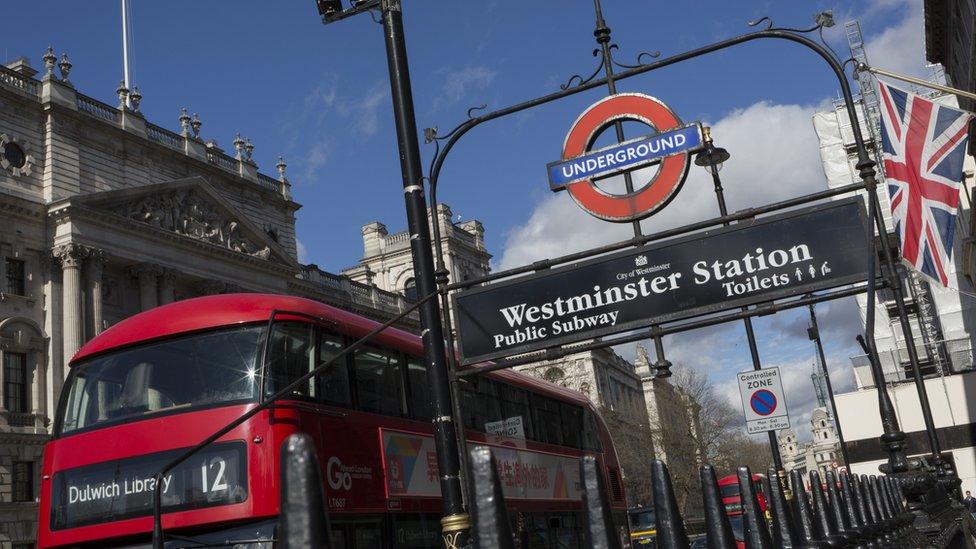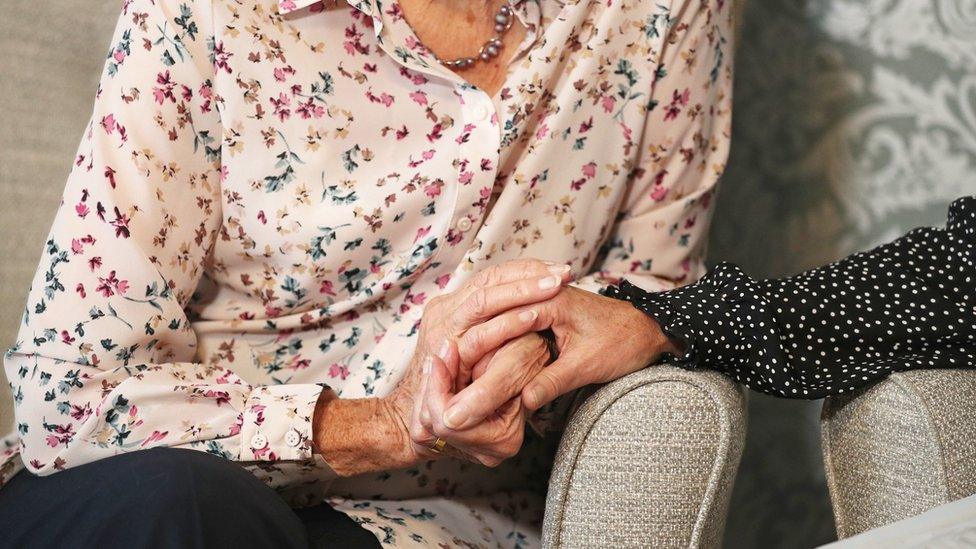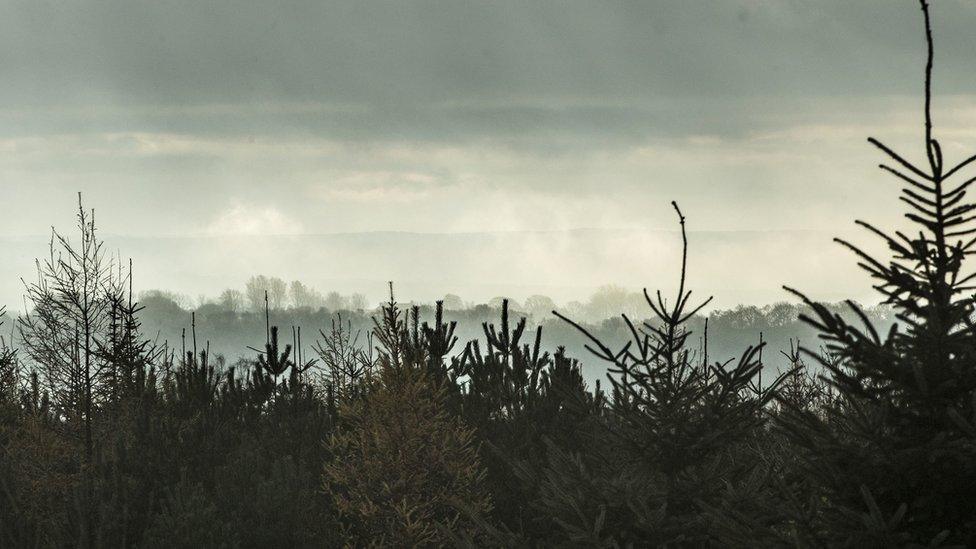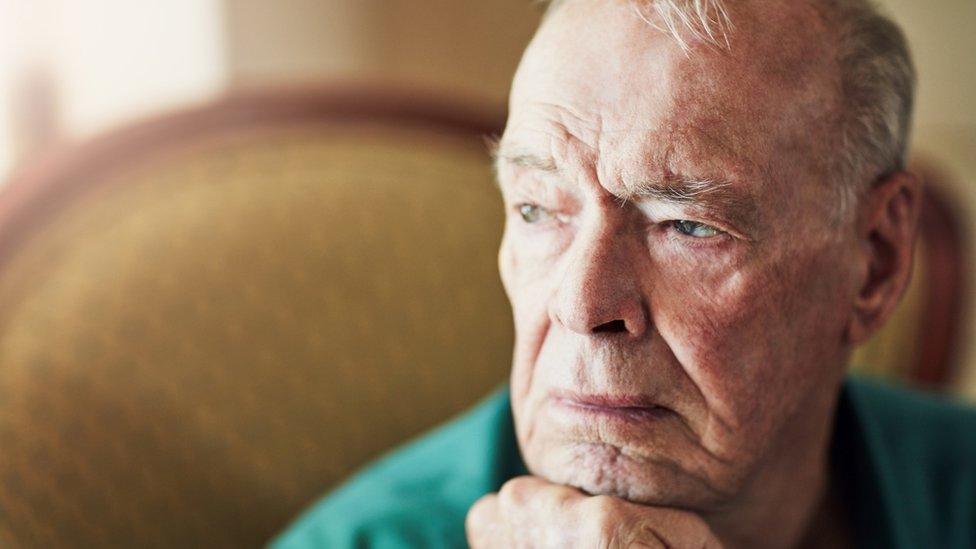What's coming up in Parliament this week?
- Published

There's some significant law-making in the Commons this week, as the government seeks to push through important small print for its system for paying for social care in England via the Health and Social Care Bill.
Might there be rebellion brewing?
Will there be read-across on the Conservative benches from the government's decision to scale down the HS2 rail scheme?
Fault-lines between those Tories pressing for more public spending to level up their constituencies, and those who worry about the extent of public spending, are looking rather more visible at the moment and the votes on this measure could be testing for the rather bruised government whips.
Meanwhile in the Lords, there will be some important preliminary skirmishing around the new public order offences that ministers want to add to the mammoth Police, Crime, Sentencing and Courts Bill.
Watch out too for a government statement or urgent question, probably earlier in the week, responding to the defence committee's report on women in the Armed Forces, where there's some behind the scenes to-ing and fro-ing at the moment.
Here's my rundown of the week ahead:
Monday 22 November
The Commons week opens (14:30) with Home Office questions - probably to be followed by the usual quota of post-weekend urgent questions and government statements.
The main legislative action is the first day of report stage consideration of the Health and Social Care Bill.
This is the crucial moment when any MP can propose changes to a bill, deleting, amending or adding whole new clauses. The result is an intricate procedural dance, where much will depend on the decisions of the chair and on the framework set for the debate in the programme motion.
There are plenty of significant amendments in play - the question is how many will actually get to be debated.
When it emerges, the programme motion will probably divide the two days of report stage into bite-sized chunks, but there will still be miscellaneous discussion of the amendments selected for debate, followed by a crucial Speaker decision on a far smaller number chosen for actual votes.

The bill will specify details of a September reform package on social care funding
The programme motion certainly will allow Health Secretary Sajid Javid to put his key New Clause 49, on the detailed working of the cap on care costs for charging purposes.
This is the small print about how much people have to fund themselves before the government picks up the tab, and the new rules have come in for considerable criticism. There is already talk of a Conservative backbench rebellion when the clause is voted on.
The health secretary will also be proposing a dozen new clauses aimed at outlawing virginity testing, and Conservative Richard Holden has a proposal to ban hymenoplasty - surgery to rebuild the hymen.
Another fair bet to be debated is the amendment from health committee chair and former health secretary Jeremy Hunt to require the government to produce a report every two years on NHS and social care staffing in England.
In effect, it would set out the staffing needed to deliver the required level of care, based on information such as economic projections and population changes.
There are a series of amendments on abortion-related issues - from not holding a woman criminally liable for procuring an abortion, (Maria Miller and Diana Johnson), banning termination of the grounds of sex (Carla Lockhart), and banning most abortions after 22 weeks, rather than the current 28 (Fiona Bruce).
Further amendments
There's an anti-privatisation amendment from Labour backbenchers, led by Richard Burgon, to make NHS trusts and foundation trusts the default providers of NHS services.
The Conservative chair of the Women and Equalities Committee, Caroline Nokes, has a new clause down on the licensing of aesthetic non-surgical cosmetic procedures.
Labour's Mary Kelly Foy has a series of amendments on anti-smoking measures. And in Alcohol Awareness Week, Dan Carden (who also leads a backbench debate on Thursday) proposes clauses on alcohol health warnings and a minimum unit price for alcohol.
John Baron, the former chair of the All-Party Parliamentary Group on cancer, has tabled a new clause designed to improve cancer survival rates by encouraging the NHS to diagnose cancer earlier, arguing that if the NHS could match the best survival rates in Europe, 10,000 lives could be saved each year.
The clause says it should put outcome measures such as one-year survival rates ahead of process targets such as waiting times.
The adjournment debate sees Labour's Rachael Maskell lead a discussion on developing the bioeconomy in Yorkshire.
I mention this as an example of a new Commons trend: post-COP26 green initiatives being plugged by local MPs.
She will be arguing for BioYorkshire - Yorkshire's Green New Deal, which aims to create 4,000 new jobs and provide training to 25,000 people, developing bio-packaging, mitigating methane, and using insect and hemp-based technologies.
In Westminster Hall, the petitions committee has scheduled a debate (18:00) is on an online petition demanding "equal pensions" for Gurkhas. The government says most Gurkha veterans receive a pension at least as good as their British counterparts.
Committee action includes Public Accounts (16:00) hearing evidence on the post-Brexit UK border from expert witnesses including Aodhán Michael Connolly, director of the Northern Ireland Retail Consortium. It will be followed up in a session with senior civil servants later in the week.
In the Lords (14:30), questions to ministers range across art or music-based interventions for people with dementia, and the emergency services approach to the attendance of ministers of religion at the scene of situations involving serious injury.
Then peers continue their twice-extended long march through the committee stage consideration of the Police, Crime, Sentencing and Courts Bill.
Tuesday 23 November
The Commons begins (11:30) with an hour of Health and Social Care Questions.
Then there's a ten-minute rule bill from Labour's Nadia Whittome to require climate change and sustainability to become key content across the school curriculum, integrated into every subject.
The bill is the culmination of her work with Teach the Future - a school pupil-led group - on climate education and the decarbonisation of the education sector.
The main business is to polish off the Health and Social Care Bill, with the remainder of report stage consideration, and then a brief, possibly entirely formal, third reading stage.
One of the amendments expected to be discussed is from Labour MP Emma Hardy on one of the most painful issues: resolving disputes between doctors and parents over the care of children with life-limiting illnesses.
On the committee corridor, Environment, Food and Rural Affairs Committee (14:30) questions Environment Minister Lord Goldsmith on the government's large-scale plans for tree planting as part of its carbon net-zero strategy.

The government wants to plant many more trees in order to help meet green targets
Defence (14.30) continues its inquiry into the withdrawal from Afghanistan, hearing from former CIA director General Petraeus, as well as Jeff Harrison, interim CEO of Combat Stress, and Sarah Jones from veterans charity Help for Heroes.
New Culture Secretary Nadine Dorries makes her debut before Digital, Culture, Media and Sport (14:30).
Discussion is expected to range across government proposals on online safety, the future of public service broadcasting, the impact of Covid-19 on the UK's cultural industry, and sports policy, especially in the light of the Yorkshire County Cricket Club racism allegations, and the pre-appointment processes for the chairs of Ofcom and the Charity Commission.
In the Lords (14:30), ministers field questions on political repression in Zimbabwe and the detention of opposition politician Makomborero Haruzivishe.
Then there's a brief third reading rubber-stamping of the Dormant Assets Bill (a measure which brings an estimated £880m of dormant financial assets into the existing scheme to release cash from unused and forgotten bank accounts).
That is followed by the report stage consideration of the Armed Forces Bill, which renews the legal framework for the Army, Navy and RAF, as well as adding some new requirements to the Armed Forces Covenant.
Watch out for a cross-party amendment led by crossbencher Lord Thomas, backed by Labour's Lord Coaker, on the military justice system. It would require murder, manslaughter and rape offences to be tried in civil courts.
Former Lord Chancellor Lord Mackay of Clashfern has an amendment down to impose the same legal responsibility to have "due regard" to the Covenant on central government as the bill requires of local councils.
Wednesday 24 November
The Commons opens (11:30) with half an hour of Women and Equalities questions, followed by Prime Minister's Questions at noon.
The day's ten-minute rule bill, proposed by Conservative MP Siobhan Baillie, and aims to clamp down on anonymous abuse on social media.
With the Online Safety Bill promised for a second reading in the Commons before Christmas, this looks like an attempt to put down a significant marker.
The main law-making is the second reading of the Commercial Rent Coronavirus Bill - a significant pandemic measure that proposes a new binding arbitration process to help landlords and tenants agree a resolution of Covid-related rent debts.
County court and High Court judgements on rent debt claims issued from 10 November 2021 will be considered by the arbitration system, and bankruptcy proceedings commenced from 10 November 2021 and resulting court orders are to be declared void.
In Westminster Hall, Conservative Jack Brereton has a debate on energy intensive industries (09:30), highlighting the problems volatile energy prices are causing ceramics manufactures in Stoke-on-Trent and the need to help the industry develop new, more efficient technologies.
There are debates on Islamophobia (14:30) and on body image in the media and online (16:00).
Committee action includes Public Accounts (14:00) following up the evidence from its Monday hearing on the UK border with a galaxy of senior civil servants headed by Alex Chisholm, the permanent secretary at Cabinet Office.
Women and Equalities (14:30) hears from religious figures and academic experts on the government's consultation on conversion therapy.
In the Lords (15:00), there are questions to ministers on preventing the takeover of NHS surgeries by American health insurance companies, and on introducing smoke-free pavements outside pubs and restaurants.
Then peers totter to the end of committee consideration of the Police, Crime, Sentencing and Courts Bill, the third and final extra day.
The extended debate is partly because of the late arrival of 18 pages of new government amendments, due to be debated in this session.
They deal with public order offences including creating new Serious Disruption Prevention Orders, sweeping search powers, and new offences to prevent protesters "locking on" to other demonstrators or to objects, or obstruct the construction or maintenance of major transport works.
All are aimed at controlling the kind of demonstrations staged by Extinction Rebellion. This being committee stage, there probably won't be any votes, but I predict a fair amount of outrage, and some serious attempts to rewrite or delete them when report stage consideration begins in December.
Thursday 25 November
The Commons opens (09:30) with questions to the Cabinet Office minister, Steve Barclay. Commons leader Jacob Rees-Mogg will then announce business for the next week.
The main debates are on backbench motions on freedom of religion or belief, and alcohol harm.
Committee action includes Digital, Culture, Media and Sport (10:00) hearing expert evidence on so-called "influencer" culture.
In Westminster Hall (13:30), the Conservatives Nick Fletcher and Philip Davies lead a debate on International Men's Day.
In the Lords (11:00), ministers are questioned on whether peers should be designated as "politically exposed persons" for the purposes of anti money-laundering rules, and on the White Ribbon campaign to end male violence against women.
Then the human rights campaigner, Lord Alton of Liverpool, leads a debate on reported remarks by the foreign secretary that a genocide is underway against the Uyghur population in China's Xinjiang region.
Lord Alton's response may be sharp, given that the Foreign Office continues to insist that only a court can make such a declaration - although any attempt to extract such a ruling from an international court is blocked. The debate will see calls for sanctions and a diplomatic boycott of the Winter Olympics.
That will be followed by a debate on the number of migrants arriving in the UK by boat, led by former Labour MP Kate Hoey, now a non-affiliated peer.
Friday 26 November
It's private members' bills day in the Commons (09:30), with the Conservative Dr Liam Fox presenting his Downs Syndrome Bill for second reading. The bill now has government support, so it can be expected to go forward for detailed scrutiny.
Next is Margaret Ferrier's Pension Schemes (Conversion of Guaranteed Minimum Pensions) Bill, which aims to rectify long-standing issues over unequal treatment between men and women in the pension system.
Third is the Conservative Saqib Bhatti's Registers of Births and Deaths Bill, which aims to move from a paper-based system to an electronic register. The bill applies to England and Wales.
As usual for a Friday sitting, there are plenty more bills listed on the Order Paper, but most will not be debated.
Related topics
- Published20 November 2022


